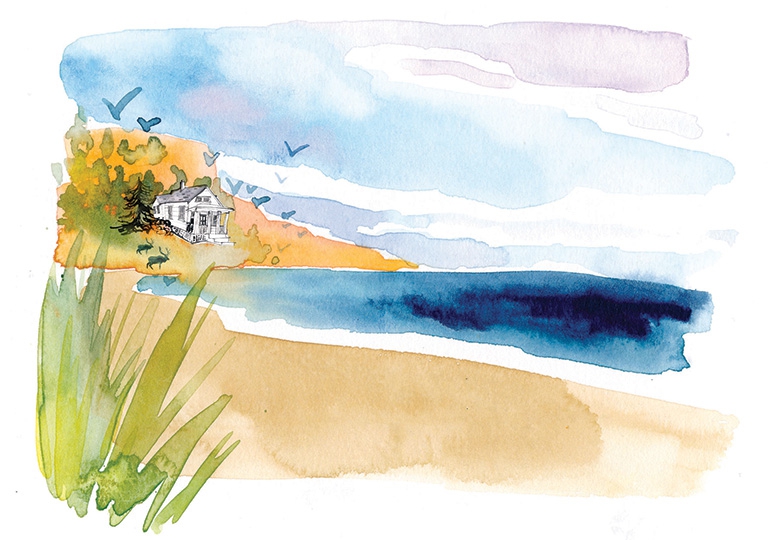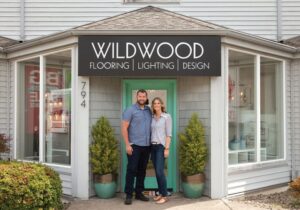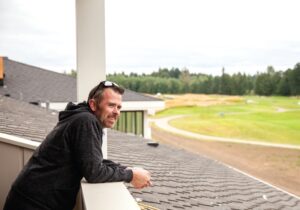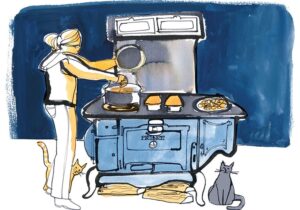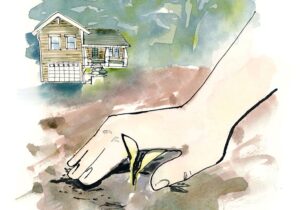Illustration by Carly Larsson
An Oregon novelist retreats to the coast to recover from loss.
It is rare to find a full-time rental in Manzanita, let alone a shingled, 1935 cottage three blocks from the Pacific. So when I heard about this place with large-paned windows, fir floors and a wood stove, not to mention a tiny cabin out back where I could write, I knew it was a chance for me to start over.
I’d relocated to the Oregon Coast several years earlier after a painful divorce that happened–uncharitably–with becoming an empty nester, and I was still trapped inside a world of despair. I felt chronically isolated living in a small duplex, aimlessly unmoored by my grief. I’d gone from a life full of family in a home filled with all the beautiful and silly things we’d acquired, a world made by and for the four of us, to a life of eerie silence in vacant and unfamiliar rooms. I wept during walks I forced myself to take. I wept while I wrote, and then I wept at what I wrote, as my grief spilled over into my work.
I was already in the middle of writing a novel about two people whose loss is assuaged by restoring a historic Sears kit home, but it wasn’t until I moved into the coastal cottage that the story deepened into an emotionally raw and psychological journey of rebuilding. My novel’s main character, June, also had to find a way to quiet the chatter in the corners of her mind. I surrounded her with my own life—waking to ancient trees full of songbirds, the ocean rhythmically crashing down the hill, even the slope and wear of the wooden floor brought to mind the generations scuffing it before me. History kept us company. I wrote all day in the cedar-scented cabin, spent evenings reading by the woodstove, sometimes enjoying a bonfire on the beach, gazing above at the dramatic blast of stars. I was not surprised when my landlord, knowing nothing of the book I was writing, mentioned that she’d purchased the cottage years ago as a place to heal after her son’s unexpected death. It was here that her life had begun again.
If a home can fill its occupants with duende, that prescient musical term for the spirit of inspiration and life, this was surely the place.
In the midst of everything, I met someone new, who held the same affinity and sensitivity to space that my fictional characters and I did. He appreciated the craftsmanship of the cottage, loved vintage, handmade textiles, old radios and the quiet joy of a sloping front porch.
Two years later we were married, and, shortly thereafter, my landlord put the cottage up for sale. It was time for her to let it go.
I would love to say that we bought the place and therein live happily ever after, but it had serious foundation issues—the perfect metaphor for carrying so much weight. And with my novel now finished, the idea of renovating a historic home was too closely attached to a story—both real and imagined—of heartache and grief. I too was ready to move on.
Then a home nearby spoke to us the same way the cottage had spoken to me. It was solidly cared for, the layout and location just right. But to make it our own required a series of cosmetic renovations.
Looking back I see what a bold move it was to begin a marriage with gutting a kitchen and bathrooms, busting up tile and knocking out a wall. Our closest friends wished us luck in a way that said we were headed for trouble. But the hassles didn’t feel like hassles. Picking out flooring and paint, deciding on cupboards and countertops, all carried a promise of home.
Two weeks after we moved in, my novel about second chances was released.
And now here we are, several seasons in. Yesterday, while cooking a pot of soup on our new gas stove, a fire going in the living room at my back, two deer arrived on our doorstep and stared directly through our windows while we laughed. Last week we watched a herd of elk resting in the meadow across the street, and several entered our yard to taste the shrubbery on their leisurely, lumbering way. Juncos, chickadees and golden crowned kinglets gather at our feeders, and we can hear that same rhythmic crashing of the ocean, even with the windows closed.
Deborah Reed’s most recent novel is The Days When Birds Come Back. Read more at deborahreedwriter.com.



